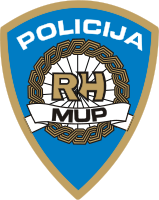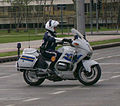- Law enforcement in Croatia
-
Police
PolicijaEmblem of Policija Agency overview Formed 1990 Preceding agency Milicija (SFRY) Legal personality Governmental: Government agency Jurisdictional structure National agency HR Governing body Ministry of the Interior (Croatia) General nature Operational structure Headquarters Zagreb, Ulica grada Vukovara 33 Minister responsible Tomislav Karamarko, Minister of Internal Affairs Agency executive Oliver Grbić, Director Police Administrations 20 Facilities Airbases Lučko (LDZL) Helicopter - Special forces, utility, SARs Agusta-Bell 212 Twin Huey Helicopter - training, personnel transport, liaisons Bell 206B-2 JetRager II Helicopter - surveillance, traffic control, training, personnel transport, liaisons Bell 206B-3 JetRager III Website www.policija.hr Law enforcement in Croatia is the responsibility of the Police (Croatian: Policija), which is a public service of the Ministry of the Interior of the Republic of Croatia, carrying out certain tasks, the so called, police activities, laid down by law.[1]
The Police deals with the following affairs: protection of individual life, rights, security and integrity, protection of property, prevention and detection of criminal offences, misdemeanors, violations, search for perpetrators of criminal offences, misdemeanors, violations and their bringing before competent authorities, control and management of road traffic, conducting affairs with aliens, control and security of state border, and other affairs defined by law.[2]
In the operative sense, police affairs are divided into affairs related to public peace and order, affairs related to security of public gatherings, affairs of the border police, affairs of safety of road traffic, affairs of counter-explosive protection, affairs of the criminal police, crime-technical affairs, crime-files affairs, administrative affairs, nationality-related affairs, status questions and asylum, affairs of protection and rescue, inspection affairs and technical affairs.[2]
In recent years, the force has been undergoing a reform with assistance from international agencies, including the Organization for Security and Co-operation in Europe since its mission began there on 18 April 1996, with Croatia being admitted to OSCE on March 24, 1992.[3]
Contents
Police powers
Police officers' powers in order to maintain peace in Croatia, such as the power to stop and search, seize property and use force, are regulated.[4] A police officer in Croatia may only stop and search a person if a court has issued a warrant and it is possible that this person has broken the law or is in possession of items or tools which are considered unlawful.
A police officer is only allowed to use firearms if there is an immediate threat to his own life or the lives of other people, to prevent a crime from being committed for which the minimum prison sentence is five years or more, or to prevent the escape of a prisoner caught committing an offence for which the prison sentence is a maximum of ten years.[4]
Organization
The General Police Directorate (Croatian: Ravnateljstvo policije) is an administrative organization of the Ministry of the Interior constituted for conducting police affairs. The General Police Directorate is responsible for:[1]
- screening and analysis of the state of security and developments leading to the emergence and development of crime;
- harmonization, guidance and supervision over the work of Police Directorates and Police Administrations;
- immediate participation in particular more complex operations of Police Directorates and Police Administrations;
- providing for the implementation of the international agreements on police cooperation and other international acts under the competence of the General Police Directorate;
- organizing and conducting of criminal forensics operations;
- setting the prerequisites for the efficient work of the Police Academy;
- adopting of standards for the equipment and technical means;
- setting the prerequisites for the police readiness to act in the state of emergency.
General Police Directorate is headed by General Police Director (Croatian: glavni ravnatelj policije).
There are the following organization forms within General Police Directorate:[5][6]
- Police Directorate (Uprava policije)
- Criminal Police Directorate (Uprava kriminalističke policije)
- Border Police Directorate (Uprava za granicu)
- Command of Special Police (Zapovjedništvo specijalne policije)
- Operational Communication Centre (Operativno–komunikacijski centar policije)
- Forensic Centre (Centar za kriminalistička vještačenja)
- Police Academy (Policijska akademija)
For immediate conducting of police affairs there are 20 Police Administrations (policijske uprave) divided into four categories, which cover the territory of the Republic of Croatia according to the organization of units of local self-government (counties or županije).
Ranks
Regular Police (Temeljna policija)
Intervention Police (Interventna policija)
Special Police or SWAT (Specijalna policija)
Weapons
Equipment
Helicopters
See also
Notes
- ^ a b Police
- ^ a b Republic of Croatia, Interpol
- ^ OSCE Mission to Croatia retrieved from here on May 19, 2007
- ^ a b Police, Croatia retrieved from here on May 19, 2007
- ^ Organizational scheme of General Police Directorate
- ^ Ministarstvo unutarnjih poslova
- ^ http://www.aalan.hr/Product-Catalogue/tabid/3622/articleType/ArticleView/articleId/11522/categoryId/274/Submachine-Gun-Type-Ero-cal-9x19mm.aspx
External links
Law enforcement in Europe Sovereign
states- Albania
- Andorra
- Armenia
- Austria
- Azerbaijan
- Belarus
- Belgium
- Bosnia and Herzegovina
- Bulgaria
- Croatia
- Cyprus
- Czech Republic
- Denmark
- Estonia
- Finland
- France
- Georgia
- Germany
- Greece
- Hungary
- Iceland
- Ireland
- Italy
- Kazakhstan
- Latvia
- Liechtenstein
- Lithuania
- Luxembourg
- Macedonia
- Malta
- Moldova
- Monaco
- Montenegro
- Netherlands
- Norway
- Poland
- Portugal
- Romania
- Russia
- San Marino
- Serbia
- Slovakia
- Slovenia
- Spain
- Sweden
- Switzerland
- Turkey
- Ukraine
- United Kingdom
- (England
- Northern Ireland
- Scotland
- Wales)
- Vatican City
States with limited
recognition- Abkhazia
- Kosovo
- Nagorno-Karabakh
- Northern Cyprus
- South Ossetia
- Transnistria
Dependencies
and other territories- Åland
- Faroe Islands
- Gibraltar
- Guernsey
- Jan Mayen
- Jersey
- Isle of Man
- Svalbard
Other entities - European Union
Categories:
Wikimedia Foundation. 2010.






























